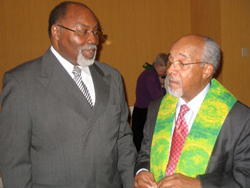Churches Uniting in Christ (CUIC) concluded its Jan. 18-20 plenary here with a liturgy of recommitment, vowing to continue the ecumenical and racial justice work begun by the group on Martin Luther King Jr. Day in 2002.
On the final day of its meeting CUIC members discussed a draft proposal for action related to the previous day’s panel discussions on the intersection of race, church, and contemporary issues.
The group came up with several possible actions in the areas of international policy, civil discourse, and the mutual recognition and reconciliation of ministries. Some ideas were specific to topics discussed earlier, such as urging elected officials to extend Temporary Protected Status for Haitians in the United States beyond July 2011, when it expires.
Broader ideas included calling on member communions to support local pastors and laypeople “in speaking prophetically to our society and world.”
The intersection of race, church, and mutual recognition and reconciliation of ministries remains a high priority for CUIC. But the ecumenical group put this work on hold in 2007 because members perceived the need to address concerns about racism within these conversations about ministry.
During the Jan. 20 session, some questioned whether resuming the conversation about recognizing and reconciling ministries would be a productive use of time. Bishop Thomas Hoyt of the Christian Methodist Episcopal Church lamented the ecumenical church’s longtime distinction between “life and witness” and “faith and order” concerns, with the ordering of ministry usually categorized as the latter.
The Rev. Robina Winbush, of the Presbyterian Church (U.S.A.) said the group’s work in the area of reconciling ministries need not take away from other priorities. “My real hope is that we don’t let ourselves off the hook by saying we’re going to set it aside,” she said.
After some debate, members decided to have CUIC’s Coordinating Council continue the efforts in this area.
The group also talked about the absence of the African Methodist Episcopal Zion Church, which suspended its participation in 2007 because its representatives felt CUIC was not making progress on racial justice issues. The AMEZ Church did not send a representative to Fort Lauderdale, but a prominent AMEZ preacher, the Rev. Staccato Powell, preached during the opening worship service Jan. 18.
CUIC’s members agreed to continue reaching out to the AMEZ Church, and said they hope the historically black denomination will return to full participation.
The group elected officers to lead its Coordinating Council for the next three years.
Bishop Ronald Cunningham of the Christian Methodist Episcopal Church was elected president; the Rev. Robina Winbush of the Presbyterian Church (U.S.A.), vice-president; the Rev. Jean Hawxhurst of the United Methodist Church, secretary; and James Tse, of the PC(USA), treasurer pro-tem.
United Methodist Bishop Sharon Rader led in the closing service of recommitment and holy communion. The liturgy was adapted from CUIC’s Inauguration liturgy, held on Jan. 20, 2002 at Mount Olive Christian Missionary Episcopal Church in Memphis, TN.
The Rev. Rebecca Bowman Woods is an ordained Christian Church (Disciples of Christ) minister and a regular contributor to United Church News and StillSpeaking Magazine.

